
Te Ara Pūtaiao: Māori Insights in Science
Year of publication
Publication type
MonographPublisher(s)
Ngā Pae o te MāramatangaPublication ISBN
0-9582610-7-5Editor(s)
Dr J. S. Te Rito Dr S. M. HealyThis monograph is a compilation of four papers presented by Māori scientists at Turnbull House, Wellington, in November 2005. The papers were delivered as part of the Ngā Pae o Te Māramatanga Policy Seminar Series “Progressing Māori Development through Research”. Each of the scientists―namely James Ātaria, Elizabeth McKinley, Michael Walker and Shane Wright―has carried out pioneering work in her or his field and contributed to wider Māori enterprise and development. The papers give an overview of their research and address issues such as being a Māori scientist, doing scientific research, barriers to Māori in science and science education and the development of policy to overcome barriers and promote Māori involvement in science.
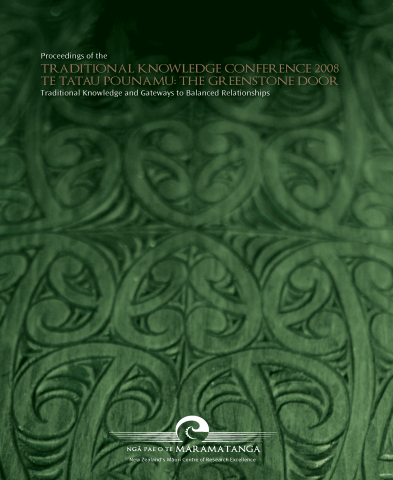
Te Tatau Pounamu: The Greenstone Door Traditional Knowledge and Gateways to Balanced Relationships
Year of publication
Publication type
Conference ProceedingsPublisher(s)
Ngā Pae o te MāramatangaPublication ISBN
0-9582610-8-3Editor(s)
Dr J. S. Te Rito Dr S. M. HealyThe Traditional Knowledge Conference 2008 focused on traditional knowledge and gateways to balanced relationships. The conference title, Te Tatau Pounamu: The Greenstone Door, referred in a figurative sense to how, in times of trouble, peace could be secured and warfare ended through a political marriage and the exchange of greenstone. The peace thus established was often likened to a greenstone door as both were seen as being durable, strong and highly valuable. In line with the title, the conference provided the occasion for discussion of indigenous strategies for sustaining relationships between collectives and over generations, for resolving conflict, for peacemaking, reconciliation and restorative justice.
While some speakers spoke directly on issues of peacemaking and restorative justice, the broader theme allowed for consideration of traditional indigenous concepts, values, ideals, models and strategies for sustaining balanced and healthy relationships within and across families, communities, nations, nation-states, local, regional and global borders, territories and environments. There was also the opportunity to share what had been learned from diverse contexts around the world about how indigenous models, values, concepts and processes have been incorporated into state or government initiatives and with what impact for indigenous peoples.
The papers in this Proceedings reflect the diversity of ways in which the theme was approached at the conference, because of the many academic disciplines represented and because community engagement and input was included. Videos of the presentations by the Invited Speakers can be viewed by going to Ngā Pae o te Māramatanga's website: www.maramatanga.co.nz.
The Proceedings are made up of two parts. Part A comprises presentations to the full conference by Invited Speakers. The Invited Speakers made oral presentations, which were videoed and later transcribed. Edited versions of these transcriptions appear here, apart from the presentation by Irene Watson who supplied a fully referenced version of her paper, "A Journey Away from Violence to a Place of Law-fullness". Part B of the Proceedings has the written papers submitted by those who gave talks in the parallel sessions.
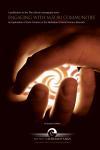
Engaging with Māori Communities - An Exploration of Some Tensions in the Mediation of Social Sciences Research (2007) by J Kidman
Year of publication
Publication type
MonographPublisher(s)
Ngā Pae o te MāramatangaPublication ISBN
0-9582610-6-7Editor(s)
Dr Joanna Kidman Dr J. S. Te RitoThis monograph explores the ways in which collaborative research relationships with Māori communities can be developed effectively and appropriately. The focus is the institutional and epistemological environments that social researchers work within. While there is a growing body of international literature about the engagement of social sciences research with indigenous communities, there are relatively few researchers who actively theorise the institutional, political, and conceptual frameworks surrounding the research engagement process with indigenous communities.
The monograph is comprised of a series of papers that look into the epistemological and institutional tensions that emerge when academic researchers engage with Māori communities. The underlying theme is that academic disciplines and institutional frameworks are structured in ways that mediate the research relationship. Peter L. Berger’s theory of mediating structures is used as an organising principle for this analysis.
In a discussion of research engagement between Māori communities and universities, the author identifies how academic ways of thinking about community, and particularly the tendency to problematise the concept, can stand in the way of establishing effective mediating structures. The paper, entitled “Collaborative Research in the Post-9/11 Climate”, explores the effect of the current world political climate on the ability of academic researchers and indigenous peoples to construct responsive collaborative relationships. Another paper investigates how the structures of disciplinary knowledge can undermine research with Māori, while the final one looks at the work of university ethics committees in mediating the research relationship with Māori communities.
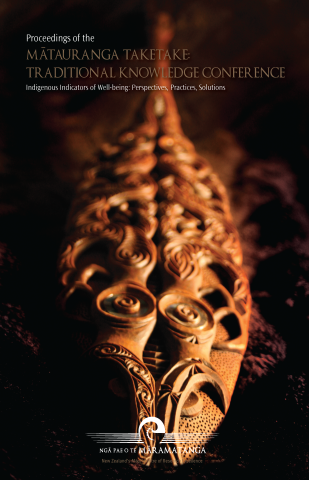
Proceedings of the Mātauranga Taketake - Traditional Knowledge Conference 2006 - Indigenous Indicators of Well-being: Perspectives, Practices,
Year of publication
Publication type
Conference ProceedingsPublisher(s)
Ngā Pae o te MāramatangaEditor(s)
Dr J. S. Te RitoThe Mātauranga Taketake: Traditional Knowledge Conference was convened in June 2006 to address issues, practices, models and perspectives for protecting, sustaining and nurturing traditional systems of knowledge. The Conference invited participants to consider the following questions:
How do we know that our knowledge, ways of knowing and associated practices are in a state of wellbeing?
What practices do we use to sustain and help the next generation look after our systems of knowledge?
How do we know that our relationships, languages, literatures, stories, environments,healing practices, spiritualities, genealogies, bodies, children, elders, women, men, and communities are flourishing?
What are the basic indicators that we use to give us confidence that all is well?
How do wemeasure our development and advancement?
Internationally generated indicators of well-being, like indicators of development, have a subtle but significant impact on Māori and other indigenous communities. An international conference with associated community workshops and satellite meetings enabled us to bring together in dialogue a wide range of participants, perspectives, voices, frameworks and models for developing indicators that best indicate well-being from indigenous points of view.
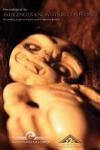
Proceedings of the Indigenous Knowledges Conference - Reconciling Academic Priorities with Indigenous Realities 2005
Year of publication
Publication type
Conference ProceedingsPublisher(s)
Ngā Pae o te MāramatangaEditor(s)
Dr Joanna Kidman Dr J. S. Te Rito Dr Wally PenetitoThis 4 day conference brought together scholars from a range of disciplinary fields and nations to develop discipline-based responses to the real-world struggles of Māori and indigenous peoples.
The purpose of Indigenous Knowledges Conference is to promote discussion and interaction between academics and indigenous communities focused in different disciplines as well as different nations. We are particularly interested in generating new thinking about academia and its role in indigenous communities and societies. We are providing a forum for established and emerging Māori and indigenous academics to map disciplinary and intellectual discourses from an indigenous perspective.
The Conference proceedings highlight the work of indigenous experts in a range of academic disciplines and offer a forum for the development of indigenous research priorities. The spirit of the confrence is encaplsulated by the proverb: Ahakoa iti, he pounamu
Literally translated, this Māori proverb says "Although small, it is greenstone". For Māori greenstone or nephrite jade is a precious taonga, a limited resource over which tribal wars were fought. Laboriously fashioned into ornamental jewellery and weapons, pounamu can be a symbol of excellence, diligence, endeavour and prestige.
We believe 'Ahakoa iti, he pounamu' is a fitting conference proverb, as pounamu defines us as a people. Throughout the world, indigenous peoples are small in number and often have to rise against superior numbers in order to safeguard customs and traditions. Although we are small in number, our indigeneity is precious.
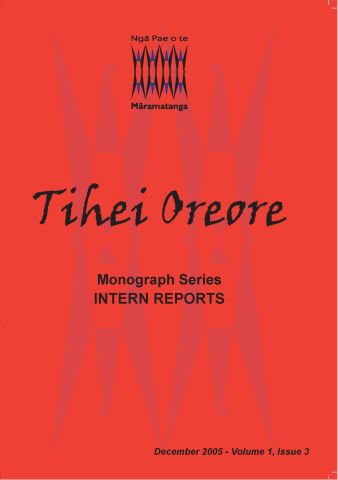
Tihei Oreore Monograph - Intern Reports (Dec.2005)
Year of publication
Publisher(s)
Ngā Pae o te MāramatangaPublication ISBN
0-9582610-3-2Editor(s)
Dr J. S. Te RitoThe following reports are the work of Māori senior undergraduate through to masters level students from various tertiary institutes throughout Aotearoa (New Zealand). These are students who were awarded summer internships by Ngā Pae o te Māramatanga during the summer of 2004–2005.
The purpose for providing these internships was as a step in putting these students on the pathway towards a career in research. The establishment of this monograph provides a forum for interns to undertake a small piece of research and to publish it. Although it is not a refereed journal, it does provide budding research students with the opportunity to gain more experience in the field of research and its publication. The reports provided here have had minimal editing and minimal input
from the students' supervisors. Therefore they should be read with this in mind. The whole exercise was also beneficial to the supervisors, in extending their experience of having a student researcher work alongside them. From the perspective of Ngā Pae o te Māramatanga, the summer internship programme also allows us to identify potential researchers for the future and to know their areas of interest.
Many Māori researchers have returned to education in later life. Consequently, while the researchers who have contributed to this publication are all interns, they are not necessarily all youthful—although the majority here are. The contents of this monograph span a wide spectrum of subject areas. These reports stand as evidence of the capacity for research and critical analysis which is strengthening as numbers of Māori tertiary students continue to grow. Ngā Pae o te Māramatanga wishes to thank its 2004–2005 summer interns, and hopes that their new net spreads wide, and brings in a harvest that will benefit all in Aotearoa/New Zealand and indeed the wider world.
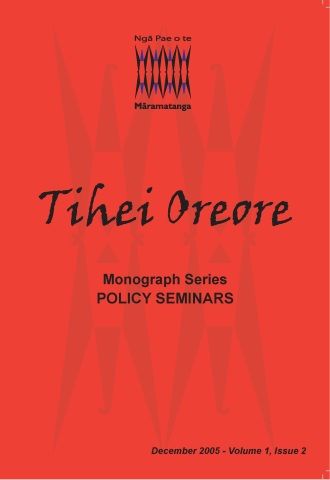
Tihei Oreore Monograph - Policy Seminars (Dec.2005)
Year of publication
Publication type
MonographPublisher(s)
Ngā Pae o te MāramatangaPublication ISBN
0-9582610-2-4Editor(s)
Dr J. S. Te RitoHigh quality research leading to practical outcomes that result in the development and advancement of Māori is fundamental to the future of the nation. It is important that policy analysts are provided a forum where they can be brought together with Māori researchers who are leading the development of this high quality research. For this reason, Ngā Pae o te Māramatanga, The National Institute of Research Excellence for Māori Development and Advancement, initiated a Research and Policy Seminar Series designed to create a space for dialogue between policy analysts and Māori researchers.
The theme selected for each Research and Policy Seminar highlighted issues that traverse the different ministries, departments and agencies, and that significantly impact on Māori cultural, social and economic development and wellbeing. The different researchers selected for each Research and Policy Seminar represented a wide variety of perspectives on the chosen theme.
In this Research and Policy Seminar Series, invited policy analysts and representatives from different ministries and government agencies heard presentations from a variety of leading Māori researchers in the country and were given the opportunity of dialogue with researchers who are not only connected to leading research institutions but also extensive community networks. Because high quality research is a creative and innovative process, engagement with top researchers is an essential ingredient in the development of policy that will have long lasting impact in both the medium and long-term in New Zealand. An additional perspective is added to the Seminar Series with the incorporation of a Ministry/Agency respondent who also presented a paper on the seminar topic.
This monograph represents a compilation of papers, including paper submissions by the researchers of their presentation, a brief submission by a representative from the Ministry of Education, Rāwiri Brell, and a paper written by Howard Fancy, Secretary for Education, which was relevant to the seminar topics. The monograph also includes a summary transcription of the discussion that took place at the conclusion of the presentations.
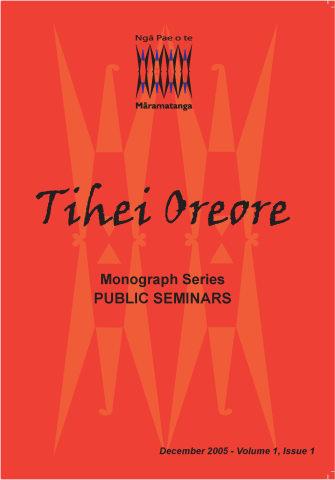
Tihei Oreore Monograph - Public Seminars (Dec.2005)
Year of publication
Publication type
MonographPublisher(s)
Ngā Pae o te MāramatangaEditor(s)
Dr J. S. Te RitoThe inaugural Ngā Pae o te Māramatanga Seminar Series 2004 and inaugural Professorial Lectures were well received by the seminar attendees. The kaupapa of the seminars and inaugural lectures was to showcase Māori researchers and their work. The seminars have provided an opportunity for showcasing an excellent sampling of the wealth of Māori research excellence which exists.
The seminars generated interest amongst a broad range of groups. This was reflected in the seminar audiences which included researchers from institutions and communities, professionals in the field, students, and both the Māori and general media.
A highlight of the series included two professorial lectures which were delivered in Tāne-Nui-ā-Rangi, Waipapa Marae. Professor Margaret Mutu, Head of Department of Māori Studies, presented her lecture entitled: Recovering Fagin's Ill-gotten Gains: Ngāti Kahu's experience in the Treaty claims settlement process. Professor Linda Smith, Joint Director of Ngā Pae o te Māramatanga, presented her lecture entitled: Māori Education in Uncertain Times: legacies, learnings and challenges. These were both extremely well received by the large audiences that attended them. Sadness followed Professor Mutu's lecture however when Professor Mutu's husband, Tūhoe Mānuera, suddenly passed away.
The seminar series concluded with a powerful joint presentation by Professors Ranginui Walker and Hirini Mead, discussing their view of Māori research excellence. Professor Ranginui Walker's lecture was titled: Growing Research Skills at Iwi Level. Professor Hirini Mead's lecture was: Researching Issues of Interest to Māori. This monograph is a compilation of papers written by some of the presenters from the 2004 seminar series.
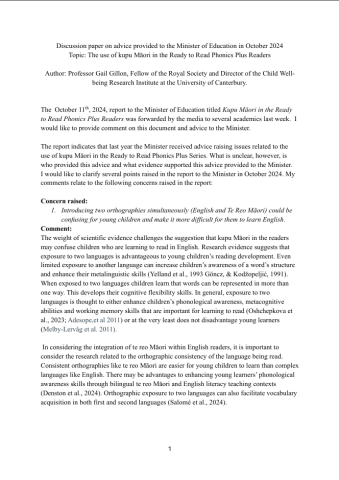
1 Discussion paper on advice provided to the Minister of Education in October 2024
Author(s)
Professor Gail GillonDiscussion paper on advice provided to the Minister of Education in October 2024
Topic: The use of kupu Māori in the Ready to Read Phonics Plus Readers
Author: Professor Gail Gillon, Fellow of the Royal Society and Director of the Child Well being Research Institute at the University of Canterbury.
The October 11th, 2024, report to the Minister of Education titled Kupu Māori in the Ready to Read Phonics Plus Readers was forwarded by the media to several academics last week. I would like to provide comment on this document and advice to the Minister. The report indicates that last year the Minister received advice raising issues related to the use of kupu Māori in the Ready to Read Phonics Plus Series. What is unclear, however, is who provided this advice and what evidence supported this advice provided to the Minister. I would like to clarify several points raised in the report to the Minister in October 2024. My comments relate to the following concerns raised in the report
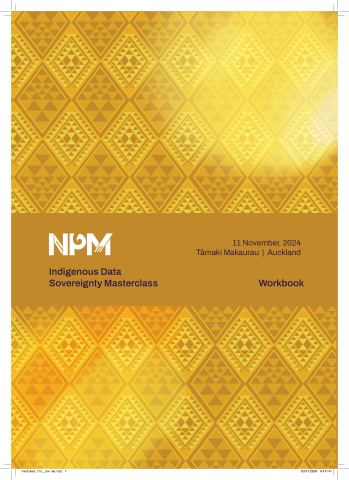
Indigenous Data Sovereignty Masterclass Workbook
It has been nearly a decade since the publication of the landmark book Indigenous Data Sovereignty: Toward an Agenda. Since then, Indigenous Data Sovereignty scholarship, solutions, advocacy and activism has flourished.
The aim of this Indigenous Data Sovereignty Masterclass is to share insights, strategies and tools with those who want to better understand how they can engage with IDSov and how it can benefit their communities and organisations.
Invited mātanga (experts) from Aotearoa and overseas will take participants through five sessions focused on the following topics:
- Indigenous Data Sovereignty Foundations
- Data for Self-Determination: Case studies
- Indigenous Data Governance Models: From local to global
- Keeping our Data Sovereign
- Growing our Data ‘Doers’